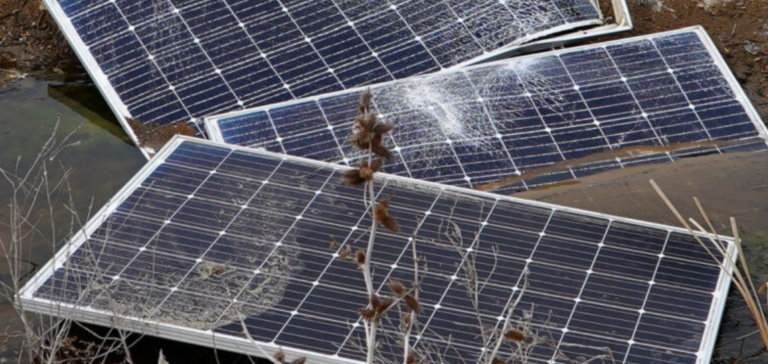The solar panel recycling industry is undergoing a significant transformation thanks to an innovative plant located near Bordeaux. Described as a technological showcase, the facility features a revolutionary method for processing used solar panels. At the heart of this innovation is a unique prototype, designed in Japan, capable of dismantling a used solar panel every two minutes.
A Revolution in Solar Panel Recycling
The process, similar to separating the layers of a millefeuille, involves using blades heated to 300°C to separate the aluminum frame, glass plate and photovoltaic cell. The glass, which makes up 70% of the panel, is then cleaned and recycled into various products such as windows, conservatories and even perfume bottles, by a major French glassmaker. This approach differs radically from the traditional method of shredding, which reduced the panels to pieces used for road sub-layers.
Ecological Impact and Recycling Efficiency at Envie 2E
Site manager Frédéric Seguin emphasizes the importance of this ecological impact, with a recycling rate of 95%. What’s more, this efficiency lies at the heart of the mission of Envie 2E, the integration company managing the site, which specializes in the processing of household electrical waste.
Photovoltaic Waste Growth and Future Challenges
With the projected increase in solar energy production in France, the amount of waste from photovoltaic panels, which have a lifespan of between 20 and 30 years, is set to increase exponentially. Nicolas Defrenne, Director of Soren, the eco-organization in charge of recycling in this sector, estimates that waste processed will rise from 3,800 tonnes in 2022 to around 300,000 tonnes by 2030.
Recovery of Critical Metals for Industry
The major benefit of this technology lies in the recovery of high-value critical metals such as silver, copper and silicon. These elements, which are essential to a range of industries including electric automotive and semiconductor production, are separated by RosiSolar, a Grenoble-based start-up. The recovery of these metals is crucial to the creation of sovereign production chains in Europe.
Ecological Strategy and Resource Independence
The International Energy Agency estimates that the reuse of these metals could cover over 60% of the needs of the photovoltaic industry, a sector facing a shortage of mineral resources. This innovation in solar panel recycling is not only environmentally friendly, but also strategic for resource independence.
At the same time, the industry needs to adapt to this new reality, moving towards longer panel life. The Envie 2E site also offers used panels for sale, after a series of rigorous tests. However, challenges remain, particularly in terms of technical compliance and acceptance by professionals and consumers.
This initiative in Bordeaux illustrates a crucial shift in solar panel recycling, combining technological innovation and ecological awareness. It paves the way for a future in which the reuse and recovery of materials become pillars of the photovoltaic industry, essential to the success of the energy transition.






















